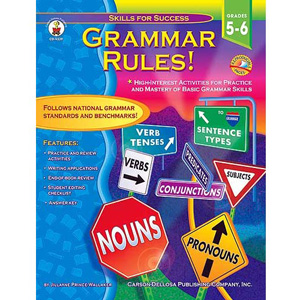
Photo from Really Good Stuff.
When it comes to grammar, I’m not quite as nit-picky as I am about spelling. Homonyms: it’s important to get those straight. Syntax is important because it can change the meaning of the sentence if the words are out of order. But I will end a sentence with a preposition. I will use “who” instead of “whom” if I think it sounds better. Sometimes I like to say “his” for a gender neutral or gender inclusive pronoun rather than do the “he/she” dance–my eighth grade English grammar textbook was old enough to perpetuate that semi-chauvinistic language rule. Other times, I’ll do the “they” thing instead of the “he/she” usage, even when the pronoun in question is not plural.
To the grammar sticklers, I’m a terrible person for making these mistakes. To them, I say, tough. I went through elementary, middle, and high school and college and learned how to use language correctly, but since I became a writer, I have decided to take liberties with my grammar when I think they help the story read better. I write very much like I speak – in contractions, ending sentences in prepositions, and starting sentences with and, but, or, and so on.
However, I do have a few rules that I really try not to break:
- No splitting the infinitive. (Notice how I said “not to break” instead of “to not break”?) This is one that I don’t remember learning in middle school, but in college, I had a professor who explained what it was, and it stuck with me. Splitting the infinitive is something you can’t do in certain other languages like French, where the infinitive is one word. In English, it’s two. To run, to write, to communicate. While I will do it without thinking in a first draft, I try to eliminate it completely in revision. Occasionally, I will use a split infinitive in a piece of dialogue, but I like to keep my dialogue real, and unfortunately, the split infinitive is true to how people speak sometimes.
- Unreferred pronouns. This one I also became hyper-aware of in college. Sometimes in French, but more particularly in my philosophy classes where we would read excessively long essays and articles by philosophers who tend to ramble on in a sort of stream of consciousness way, forgetting to specify to which “it” they are referring. It’s much harder to detect than the split infinitive, and it’s usually easier to find if you read it out loud. However, every now and again, the unreferred pronoun pops up when you’re in the writing zone. This one has to be fixed because it’s not just an aesthetics factor–it can cause confusion.
- Not putting a comma before the word “but”. This one I picked up from a coworker at my last job. I think it had already been an automatic thing in my writing, but you really start to notice it when somebody else points it out so often. “But” is usually used as a conjunction between two clauses, and in those cases, there should be a comma. The only exceptions here are for REALLY short clauses. For example, “The sentence, which was harsh but fair, was passed at 9 AM.” Even here, it would be a little better to insert a comma after “harsh,” but it breaks up the sentence a little too much seeing as the phrase is so short, so for me, it’s not entirely obligatory.
I have plenty of other pet peeves when it comes to writing and speaking incorrectly, but not all of them are grammar-related. What are some of your biggest complaints about grammar mistakes?
For instance Xylocaine causes numbness in an area of your body. Given during childbirth. Secondly treats emergency heart problems. There were only couple of examples. What is the most significant information you should know about canadian viagra? A lot of patients know this drug as Sildenafil. Whereas erectile dysfunction is more common in men over sixty, men of any age can unable to have an erection. Notwithstanding sex is not vital for good soundness, it’s undoubtedly good for you. Diabetes can lead to erectile malfunction. While the generic is credited with nerve hurt, it can also kill the mood in bedroom. Very likely you already heard that any generic has side effects.
Leave a Reply